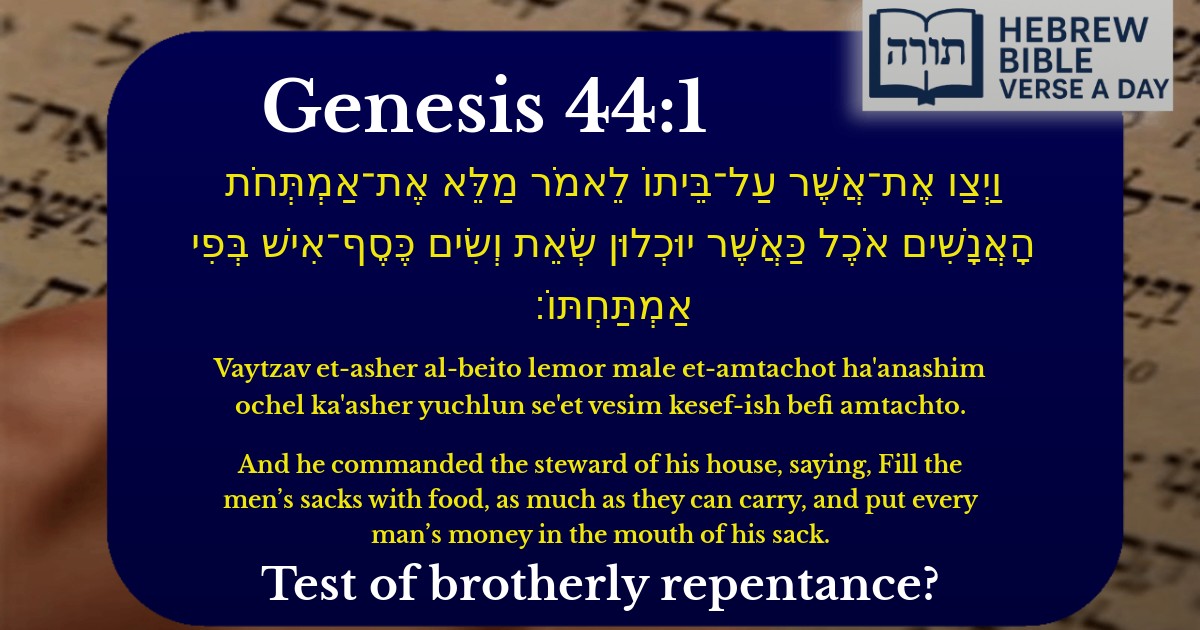Join Our Newsletter To Be Informed When New Videos Are Posted
Join the thousands of fellow Studends who rely on our videos to learn how to read the bible in Hebrew for free!
Hebrew Text
וַיְצַו אֶת־אֲשֶׁר עַל־בֵּיתוֹ לֵאמֹר מַלֵּא אֶת־אַמְתְּחֹת הָאֲנָשִׁים אֹכֶל כַּאֲשֶׁר יוּכְלוּן שְׂאֵת וְשִׂים כֶּסֶף־אִישׁ בְּפִי אַמְתַּחְתּוֹ׃
English Translation
And he commanded the steward of his house, saying, Fill the men’s sacks with food, as much as they can carry, and put every man’s money in the mouth of his sack.
Transliteration
Vaytzav et-asher al-beito lemor male et-amtachot ha'anashim ochel ka'asher yuchlun se'et vesim kesef-ish befi amtachto.
Hebrew Leining Text
וַיְצַ֞ו אֶת־אֲשֶׁ֣ר עַל־בֵּיתוֹ֮ לֵאמֹר֒ מַלֵּ֞א אֶת־אַמְתְּחֹ֤ת הָֽאֲנָשִׁים֙ אֹ֔כֶל כַּאֲשֶׁ֥ר יוּכְל֖וּן שְׂאֵ֑ת וְשִׂ֥ים כֶּֽסֶף־אִ֖ישׁ בְּפִ֥י אַמְתַּחְתּֽוֹ׃
וַיְצַ֞ו אֶת־אֲשֶׁ֣ר עַל־בֵּיתוֹ֮ לֵאמֹר֒ מַלֵּ֞א אֶת־אַמְתְּחֹ֤ת הָֽאֲנָשִׁים֙ אֹ֔כֶל כַּאֲשֶׁ֥ר יוּכְל֖וּן שְׂאֵ֑ת וְשִׂ֥ים כֶּֽסֶף־אִ֖ישׁ בְּפִ֥י אַמְתַּחְתּֽוֹ׃
🎵 Listen to leining
Parasha Commentary
📚 Talmud Citations
This verse is quoted in the Talmud.
📖 Chullin 91a
The verse is referenced in a discussion about Joseph's actions and his treatment of his brothers, illustrating his kindness and wisdom.


Context of the Verse
This verse (Bereshit 44:1) describes Yosef's instruction to his steward to fill his brothers' sacks with food and return their money secretly. This occurs after Yosef's brothers come to Egypt to buy grain during the famine, unaware that the Egyptian viceroy is their brother.
Rashi's Explanation
Rashi (Bereshit 44:1) explains that Yosef's command to return the money was part of his plan to test his brothers' integrity. By placing the money in their sacks, Yosef created a scenario where they would be accused of theft, allowing him to observe whether they would stand by Binyamin (the youngest brother) when he was framed later. This tested whether they had repented for selling Yosef into slavery years earlier.
Rambam's Perspective on Divine Providence
Rambam (Moreh Nevuchim 3:36) discusses how Hashem orchestrates events to bring about repentance and reconciliation. Yosef's actions align with this principle—his seemingly harsh treatment of his brothers was ultimately for their spiritual benefit, leading them to acknowledge their past wrongdoing and demonstrate changed behavior.
Midrashic Insights
Halachic Implications
The Chofetz Chaim (Shemirat HaLashon) derives from this episode the importance of judging others favorably. Yosef's brothers initially assumed the money was placed in their sacks by mistake (Bereshit 43:12), not realizing it was part of a larger divine plan. This teaches that one should not hastily suspect others of wrongdoing.